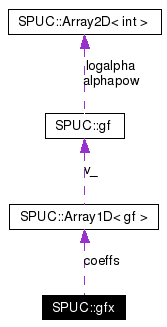
#include <gfx.h>
Collaboration diagram for SPUC::gfx:

Public Member Functions | |
| gfx () | |
| Constructor. | |
| gfx (int qvalue) | |
| Constructor. | |
| gfx (int qvalue, int indegree) | |
| Constructor. | |
| gfx (int qvalue, const ivec &invalues) | |
| Constructor. | |
| gfx (int qvalue, char *invalues) | |
| Constructor. | |
| gfx (int qvalue, string invalues) | |
| Constructor. | |
| gfx (const gfx &ingfx) | |
| Copy constructor. | |
| int | get_size () const |
| Return q. | |
| int | get_degree () const |
| Return degree of gf(q)[x]. | |
| void | set_degree (int indegree) |
| Resize the polynomial to the given indegree. If the new polynomial is bigger, then the new coefficients are set to zero. | |
| int | get_true_degree () const |
| Return true degree of gf(q)[x]. | |
| void | set (int qvalue, const char *invalues) |
| Set the gf(q)[x] polynomial. | |
| void | set (int qvalue, const string invalues) |
| Set the gf(q)[x] polynomial. | |
| void | set (int qvalue, const ivec &invalues) |
| Set the gf(q)[x] polynomial. | |
| void | clear () |
| Set all coefficients to zero. | |
| gf | operator[] (int index) const |
| Acces to individual element in the gf(q)[x] polynomial. | |
| gf & | operator[] (int index) |
| Acces to individual element in the gf(q)[x] polynomial. | |
| void | operator= (const gfx &ingfx) |
| Copy. | |
| void | operator+= (const gfx &ingfx) |
| sum of two gf(q)[x] | |
| gfx | operator+ (const gfx &ingfx) const |
| sum of two gf(q)[x] | |
| void | operator-= (const gfx &ingfx) |
| Difference of two gf(q), same as sum for q=2^m. | |
| gfx | operator- (const gfx &ingfx) const |
| Difference of two gf(q), same as sum for q=2^m. | |
| void | operator *= (const gfx &ingfx) |
| product of two gf(q)[x] | |
| gfx | operator * (const gfx &ingfx) const |
| product of two gf(q)[x] | |
| gf | operator() (const gf &ingf) |
| Evaluate polynom at alpha^inexp. | |
Public Attributes | |
| Array1D< gf > | coeffs |
Friends | |
| gfx | operator * (const gf &ingf, const gfx &ingfx) |
| Multiply a gf element with a gf(q)[x]. | |
| gfx | operator * (const gfx &ingfx, const gf &ingf) |
| Multiply a gf(q)[x] with a gf element. | |
| gfx | operator/ (const gfx &ingfx, const gf &ingf) |
| Divide a gf(q)[x] with a gf element. | |
| ostream & | operator<< (ostream &os, const gfx &ingfx) |
| Output stream. | |
|
|
Constructor.
|
|
|
Constructor.
|
|
||||||||||||
|
Constructor.
|
|
||||||||||||
|
Constructor.
|
|
||||||||||||
|
Constructor.
|
|
||||||||||||
|
Constructor.
|
|
|
Copy constructor.
|
|
|
Set all coefficients to zero.
|
|
|
Return degree of gf(q)[x].
|
|
|
Return q.
|
|
|
Return true degree of gf(q)[x].
|
|
|
product of two gf(q)[x]
|
|
|
product of two gf(q)[x]
|
|
|
Evaluate polynom at alpha^inexp.
|
|
|
sum of two gf(q)[x]
|
|
|
sum of two gf(q)[x]
|
|
|
Difference of two gf(q), same as sum for q=2^m.
|
|
|
Difference of two gf(q), same as sum for q=2^m.
|
|
|
Copy.
|
|
|
Acces to individual element in the gf(q)[x] polynomial.
|
|
|
Acces to individual element in the gf(q)[x] polynomial.
|
|
||||||||||||
|
Set the gf(q)[x] polynomial.
|
|
||||||||||||
|
Set the gf(q)[x] polynomial.
|
|
||||||||||||
|
Set the gf(q)[x] polynomial.
|
|
|
Resize the polynomial to the given indegree. If the new polynomial is bigger, then the new coefficients are set to zero.
|
|
||||||||||||
|
Multiply a gf(q)[x] with a gf element.
|
|
||||||||||||
|
Multiply a gf element with a gf(q)[x].
|
|
||||||||||||
|
Divide a gf(q)[x] with a gf element.
|
|
||||||||||||
|
Output stream.
|
|
|
|
 1.4.4
1.4.4